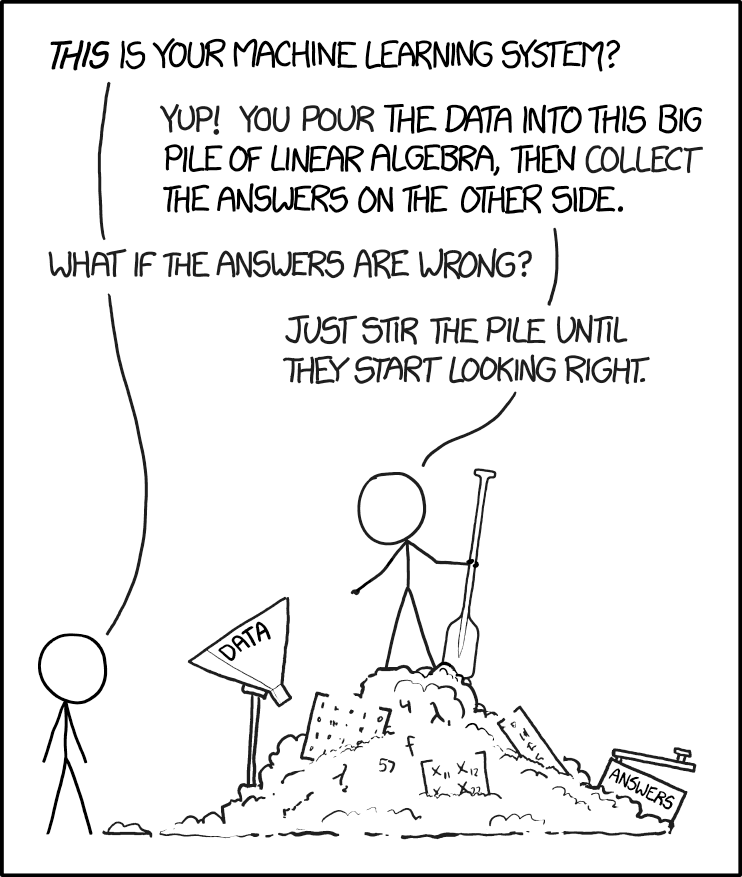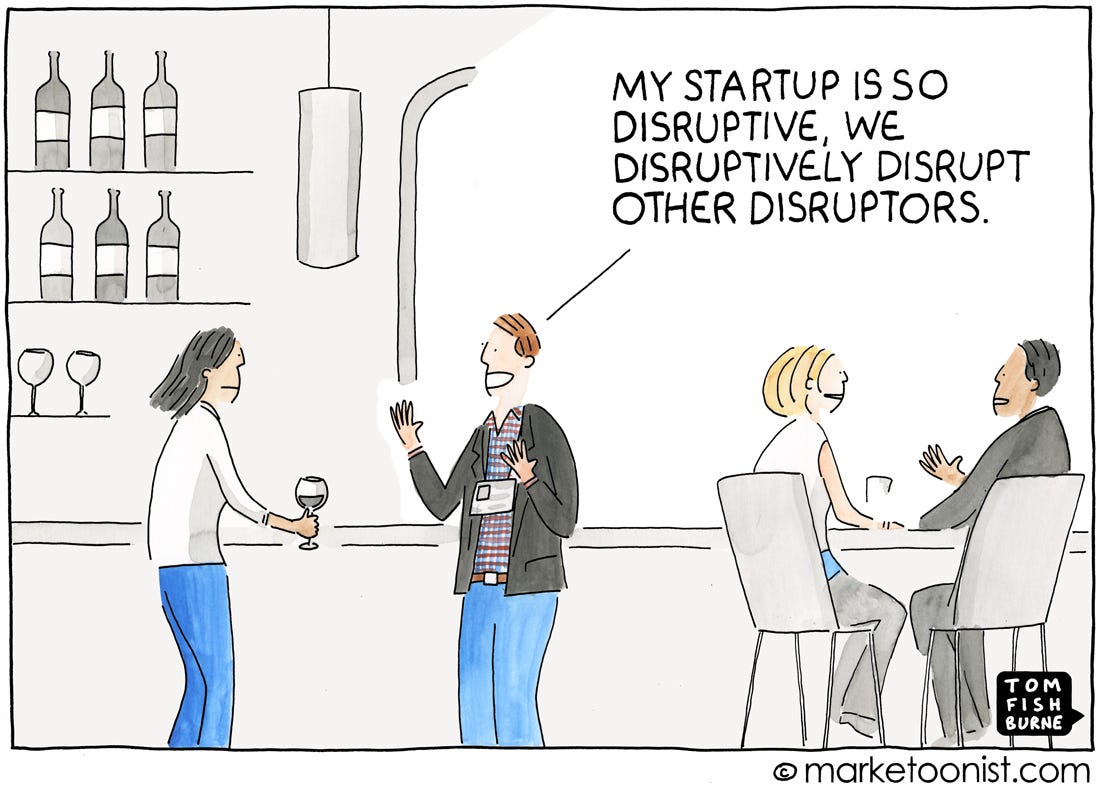Do you ever feel like people say things just to, well… say things?
Clearly, vocabulary has been on my mind a LOT this week. If you follow the faith-based series I write on my Medium channel, you’ll know I just published two posts (here and here) earlier this week on how words we use can have a powerful effect for the good and for the not-so-good. And that got me thinking, this isn’t just a faith problem. I can’t tell you how many times I’ve heard people use specific words in business and walk away confused as heck. Usually, when people use buzzwords like the ones below, they’re doing so because…
A. They have no idea what they’re talking about and want to sound cool, or
B. They have good intentions about what they want… but still have no idea what they’re talking about.
Well, friends, it’s time to demystify some of the biggest buzzwords I’ve experienced in my time. The structure of this post is pretty simple: we’ll list the word/phrase, what it isn’t, and what it is. (And to spice things up, I’ve tossed in a few comics that best illustrate a few particular terms.)
Okay, who has their cards and markers ready? Because it’s time to play some buzzword bingo!
1. Artificial Intelligence (AI)
What it isn’t: The answer to all your problems; code that basically takes on a mind of its own to be able to do
What it is: At the top of our list for a reason, this is by far the most misused/misunderstood term in the business world. To summarize, AI is whole suite of computer science topics that build toward this general idea of enabling machines to do things for us in a faster, more efficient way. So stuff like machine learning, robotics, and computer vision all roll up under the general header of AI. My friend Dr. Raj Ramesh has put together a fantastic YouTube video on this, so rather than bore you more here, I definitely encourage you go check that out.
2. Data Scientist
What it isn’t: An established role with an established skillset that just came out in, oh… like, the last five years
What it is: A way to make your statistician friends bang their head against the wall. Transparently, this is one I probably misused in the past because it genuinely does sound like its something new and novel. The best definition I’ve heard came from Dr. Usama Fayyad, and it basically goes something along the lines of “Somebody who is better at data engineering than most statisticians, and somebody who is better at statistics than most data engineers.” Yeah, not so glamorous when you put it that way. Still, I find it to be a highly fascinating area of work, so that’s not going to stop me from pursuing this learning path anyway.
3. “Doing Agile”

What it isn’t: A set framework for software development that effectively does away with the traditional “waterfall” way of doing things
What it is: Let’s set the record straight: the word agile itself isn’t a noun. You can’t DO agile; you ARE agile. If you ever take a look at the agile manifestothat kicked off this whole agile revolution, you’ll see that it was started as a means to focus on churning out work in a more effective way, by any means that works best for that given team. Some well-intentioned folks decided to put frameworks around this agile idea to help teams move away from former ways of thinking… and it quickly became this confusing, unintuitive monster. Agile development was never intended to be another list of rules that people have to memorize. Rather, it was supposed to be freeing and empowering… two words that I’m certain you don’t associate to agile development. (Lol… *cries internally*)
4. Going to the Cloud
What it isn’t: Free…?
What it is: Don’t get me wrong, cloud computing is great and most certainly the way of the future. The idea that you can utilize an elastic infrastructure that you don’t have to build on your own is amazing, but the challenge is that most companies aren’t going to get there overnight. If the way you architect your systems to interact with cloud environments is poor… you might as well construct on-premise solutions because you’ll be paying out the nose to do anything on the cloud. Additionally, different clouds offer different solutions, so if you architect yourself utilizing AWS specific tools, it’s likely that your architecture won’t translate super well to Google Cloud Platform or Microsoft Azure. Speaking of architecting systems…
5. Architecture
What it isn’t: A standard suite of deliverables that will solve all your problems (Are you seeing a theme yet around quick-hit solutions…?)
What it is: As a business architect myself, this one is nearest and dearest to mine own heart. I’m often asked, “Will producing X architectural deliverable help me to solve my problem?” Maybe, but if you’re looking for an architectural deliverable because you have no idea what you want, then the answer is probably no. Just like blueprints to a house, both business and technical architecture are great at putting together a plan to architect a solution, often in a visual manner. But if you don’t have any idea what kind of house you want to build (if it’s a house at all), the architecture just isn’t going to help you much. ¯\_(ツ)_/¯
6. Data Lake (Or Big Data)

What it isn’t: A means of getting all your data in one place that is going to automagically make sense of it all
What it is: You got the first part right: it is all about getting your data together in one place. The tricky piece is that second part. A data lake can quickly become a data junkyard if you’re not careful, and that unfortunately happens more often than you might think. Getting your data in one place is essentially useless if you have no means of properly sorting and sifting through it. To do that, you really need to apply sound data management principles to your data lake. Otherwise… garbage in, garbage out.
7. Epics, Features, and Stories
What it isn’t: An intuitive way for people to organize their work under agile frameworks
What it is: A hot mess of confusion. Again, this is another one of those things where well-intentioned folks tried to help people make sense of organizing their work into categorical tiers, but they’ve become so convoluted that I’ve watched people spend much more time trying to figure out what an epic actually is rather than writing the epic. If you have no idea what these things are, they’re basically categories of work that roll up under one another. A story (2–3 weeks of work) rolls up to a feature (3–4 months of work) rolls up to an epic (9–12 months of work). The concept is sound; the wording is confusing. So if the phraseology trips you up, find what terms work best for organizing your work.
8. Growth Hacking
What it isn’t: Computer hacking (Like… not even close)
What it is: Ugh… this one makes me sad because I actually really, really like this concept! What growth hacking basically is is a continuous partnership between marketing, product/IT development, and analytical researchers to constantly experiment with new ideas that hopefully resonate well with your customers. I personally love this concept, but since people associate hacking too closely with something like Anonymous or WikiLeaks would do, it’s sort of gotten a bad name. (If you’re interested more about this topic, check out the books Growth Hacker Marketing or Hacking Growth.)
9. Disruption / Disruptors

What it isn’t: Anything different than something new / innovative / novel
What it is: I think the “what it isn’t” pretty much sums it up. People just say this to sound cool. This post has already gotten crazy long, so since I have nothing else to say about this one, let’s move on! *cheesy grin*
10. Servant Leadership
What it isn’t: Beating yourself up for the betterment of your team
What it is: I’m not going to cover this one deeply here because I think it merits its own full post. In short, I think servant leadership gets a really bad wrap because of its name. I genuinely think servant leadership is an excellent concept, but because it has a name associated with this image of the “Ask Jeeves” butler… nobody really wants to adopt it.
Phew, we’ve come a long way! I hope you got something out of this article. It was a fun one for me to write, but my wife is telling me I have to come back to bed. (As I write this, it’s 3:11am.) Catch you all in the next post!
